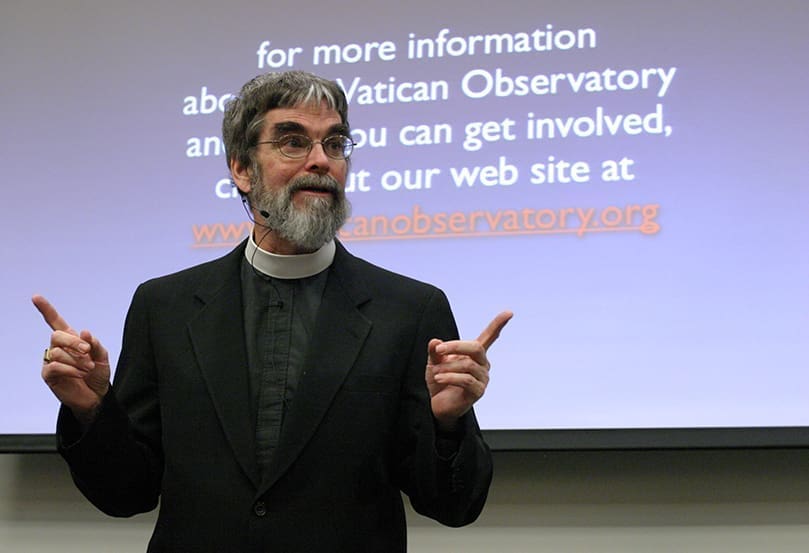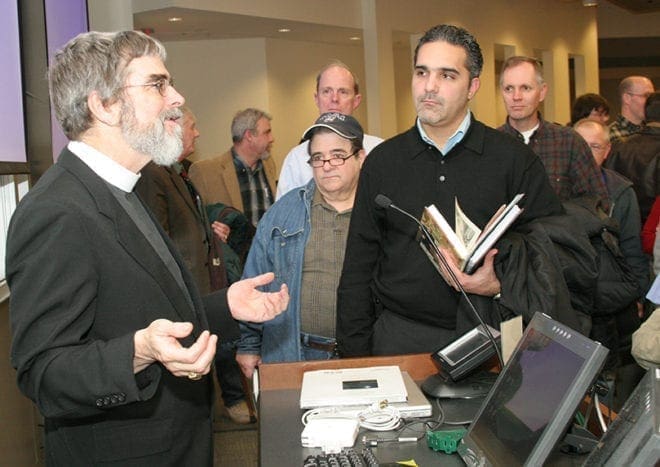 Photo By Michael Alexander
Photo By Michael AlexanderAtlanta
Vatican Astronomer Discusses Elusive Truth Of Science
By STEPHEN O'KANE, Staff Writer | Published March 4, 2010
Many people might be surprised to learn that the Catholic Church has experts in astronomy, cosmology and planetary science as well as one of the world’s oldest astronomical research facilities. For Jesuit Brother Guy Consolmagno, curator of meteorites for the Vatican, it is a typical day at the office.
Brother Consolmagno, a Detroit native and Ph.D. in planetary science, recently visited Atlanta to give two lectures at local colleges. On Monday, Feb. 15, he presented a talk entitled, “Truth in Science: Galileo to Today, Reflections of a Vatican Astronomer,” at Emory University, and the following night he spoke on “Planetary Ethics” to a group at Agnes Scott College.
The purpose of his visit “was to bring the Catholic scholarly presence to campus in a field of science, physics and astronomy,” said Dr. Phillip Thompson, executive director of the Aquinas Center of Theology at Emory University, which sponsored the lectures.
“It was also a wonderful and unique chance to explore how a person of religion, in this case a Jesuit brother trained at MIT and Harvard, can be comfortable in both worlds,” he continued. “He encouraged many young people on how to think about their faiths and their academic interests and to see these as compatible. As he stated, studying the creation is a way of seeing the glory of the Creator. It is a very good thing.”
The lecture started off with a viewing of Brother Consolmagno’s visit to the Colbert Report, a satirical late night television program on Comedy Central starring political humorist Stephen Colbert. The Jesuit brother talked with Colbert about the possibility of other intelligent life in the universe and was well received by viewers because of his humor, wit and down-to-earth nature.
At Emory, Brother Consolmagno cleared the air right away, saying that even though the talk’s title mentioned Galileo Galilei, it was not going to be a lecture on the religious trial of the scientist, who was among the first to observe that the earth was not the center of the universe, or the reasons why he was brought to trial. Rather, Brother Consolmagno used Galileo, as well as examples of other scientists at the time, to demonstrate why there were several different theories of the rotation of the planets being argued during the 16th and 17th centuries.
“His larger point was that science is always based on the latest data and the most recent viable theory using that data,” said Thompson. “The truth is often elusive and tentative in science. (Brother Consolmagno) noted that religion is different and is not based on the same kind of shifting data points although it has some flexibility as well.”
Reading from primary texts of Galileo’s time, Brother Consolmagno compared, contrasted and pulled apart theories of the Italian mathematician and astronomer as well as those of Orazio Grassi, a Jesuit contemporary, Tycho Brahe, a 16th-century Danish astronomer, and others, explaining what has stood the test of time and also which mistakes they made, in light of today’s science.
Philosophers still read Plato and writers still read Shakespeare, but no astronomer reads Galileo as a source of absolute authority because his work is obsolete by today’s standards, the Jesuit said.

Mariano Maluf of St. Michael the Archangel Church, Woodstock, holding the books, listens as Jesuit Brother Guy Consolmagno, continues a discussion with a small group of people following his talk at Emory University’s Candler School of Theology. Photo By Michael Alexander
“All scientific work is incomplete,” said Brother Consolmagno, adding that both Galileo and Grassi were guilty of seeing what they wanted to see in their work.
Scientific advances are contingent upon our understanding in other areas, he said.
A large crowd included more than a hundred people of all ages. By the time the lecture started, it was standing room only and as the talk went on, the group was visibly captivated.
“It was fascinating just looking at the diversity of the audience. The age range was from 10-80,” said Thompson. “In the audience there were students, scientists and Catholics from the community. One of our goals is to bring down the barriers between the university and the surrounding community. These worlds need to interact and both can benefit from the interaction. Brother Guy really did that in an amazing way.”
Maria Webb, a parishioner at the Cathedral of Christ the King, said the lecture was “incredibly fascinating” and dealt with a complicated issue that isn’t discussed much.
“It wasn’t what I expected, but I could recognize the importance of looking back at the early astronomers,” she said.
Webb was one of many who approached a microphone at the end of the talk to ask questions. Some were interested in what the brother did day-to-day, while others were curious about how science strengthens his belief in God.
Relating his prayer life to his study of the universe, Brother Consolmagno said, “When God invites me to play with him in the universe, I feel the same sort of thing.” He added that creation is like a puzzle and studying it confirms a sense of goodness in the universe.
He also had the chance to visit with undergraduates in a “Nature of Evidence” class at Emory and discuss issues they thought were important. Thompson said this was a unique experience for the students, and they were able to ask what he does as curator of meteorites as well as about his personal faith life.
“The students were very respectful and somewhat quiet at first,” Thompson said. “Then when Brother Guy talked in good faith and with some timely humor about how science works in the real world as opposed to theoretically, they began to relax and ask questions.”
During the 1970s, Brother Consolmagno earned his bachelor’s and master’s degrees from the Massachusetts Institute of Technology, Cambridge, and his Ph.D. in planetary science from the University of Arizona’s Lunar and Planetary Laboratory. He conducted postdoctoral research and taught at Harvard College Observatory and at MIT. In 1983, he joined the Peace Corps to teach astronomy and physics in Kenya. Nearly six years later, he was accepted into the Society of Jesus and took vows as a brother in 1991. He has been assigned to the Vatican Observatory outside Rome, Italy, since 1993, where he specializes in the study of meteorites and asteroids. He is the co-author of six books and numerous scholarly articles and his work has taken him to Antarctica.
For those interested in hearing Brother Consolmagno, Emory University has posted videos of him speaking on its Web site.